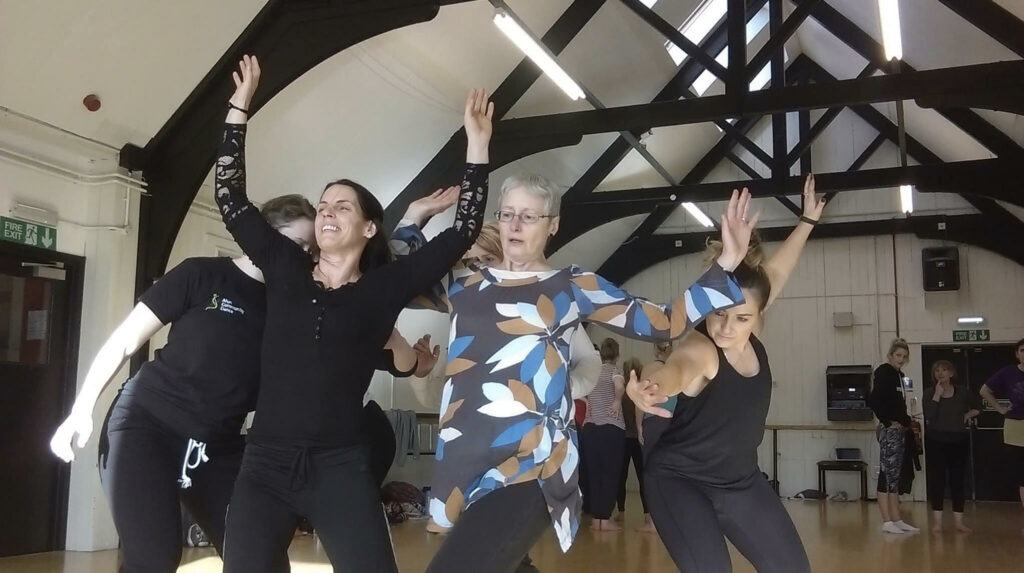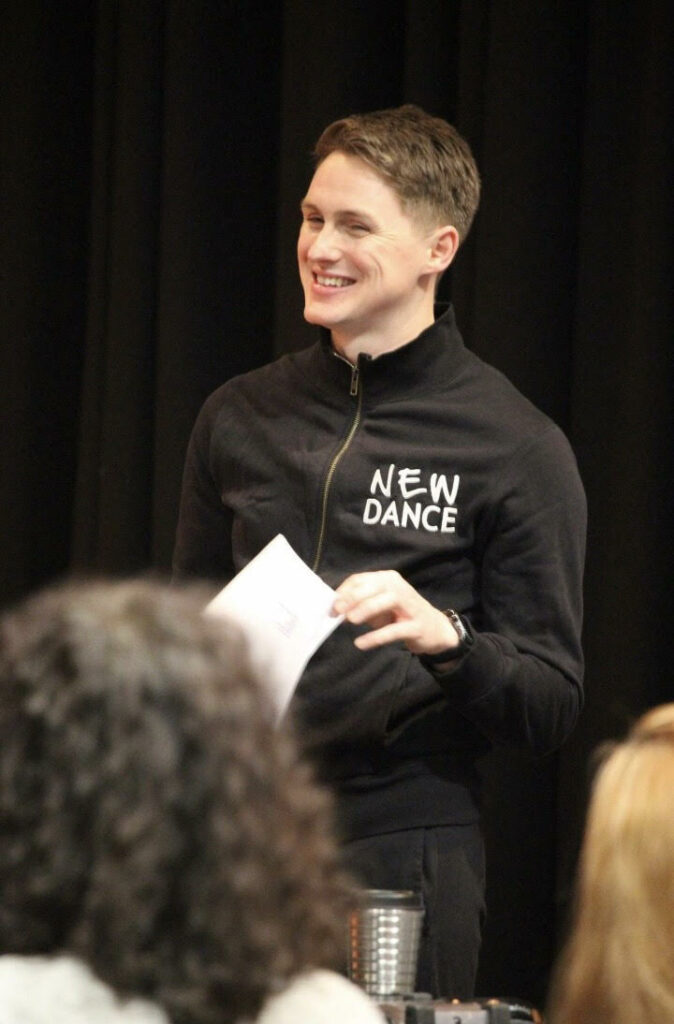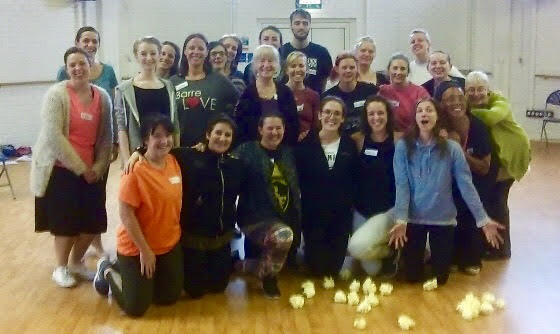In response to the lockdown triggered by COVID-19, many arts organisations have taken their work online, sharing content for audiences to view for free. However, creating participatory engagement online is much more challenging and, as a sector used to being face to face with people in their practice, it’s clear that the current restrictions change the nature of participatory arts based activity substantially.
Following a vital conversation on social media led by Guy O’Donnell, Learning and Participation Producer, National Dance Company Wales which opened a discussion on how we can deliver participatory arts effectively, a range of partners are collaborating to lead Zoom discussions for the sector where we can talk about the impact of the lockdown on our work and work creatively together to think beyond the lockdown.
In partnership with ArtWorks Cymru a series of free Zoom meetings have been set up to discuss and share current working practices in participatory delivery.

Thinking Beyond the Lockdown
These Zoom meetings will explore how we think beyond the lockdown. We’ll explore what the future might hold, what we might keep from our online experiences, and how we live with an uncertain future.
Tracey Brown, Mentoring, Training, Development Leader and Kathryn Williams, Director, Rubicon Dance Dance are presenting at the Dance focused Zoom meeting on Wednesday the 10th of June 3-5pm.
Kathryn Williams, Director, Rubicon Dance is presenting at the Community Arts meeting organised by Tanio on Thu, 11 June, 2-3.30pm
The meetings are free to attend but numbers are limited. Kathryn and Tracey share their biographies below and some information on of areas they will discuss at the meetings below.

Kathryn Williams
Rubicon’s Director since 2014, I studied Dance at Roehampton. My career has spanned IT, Finance as well as the Third Sector and the Arts. I have an MSc in Entrepreneurship, I’m a Lead Wales graduate and I’m also Wales’ first Pilotlighter.
I think that access to the arts is a democratic right and this very much spaces my approach to what I do. I’m also a School Governor, childcare campaigner, advocate for the arts and committed martial artist. I live in the former mining community of the Rhondda in South Wales with my husband and teenage sons.
Tracey Brown
Tracey has worked at Rubicon since September 1996 and her very first role was Dance Development Worker, leading dance sessions for a wide range of ages, abilities and backgrounds and contexts whilst setting up Rubicon’s development programme across Cardiff which initially targeted five key areas of the city.
Tracey now manages Rubicon CPD programmes, an annual summer programme for community dance practitioners from across Wales, an individual learning programme for Rubicon’s dance practitioners, the community dance apprentice training programme, mentor development as well as the Wales Wide Training Programme (WWTP).

Highlight’s for Tracey’s time at Rubicon includes the success and reach of the development programme, the Rubicon to Romania programme working with deaf children in Craiova, the community dance apprentice programme and the Wales Wide Training Programme! In 2017 Tracey won a Creative and Cultural Skills Council UK Award for her work with community dance apprentices.
Wales Wide Training Programme (WWTP)
At the Dance meeting Tracey will talk about the Wales Wide Training Programme (WWTP) which is an initiative that exists to support the development of community dance practice and provision across Wales. WWTP was established in 2013 with seven partners, all of whom were community dance/arts organisations. There are now seventeen partners from across Wales and these include venues and theatres, universities, national companies, colleges as well as the initial community dance and arts organisations. WWTP is steered by the partners who work together to design and organise training and professional development programmes that respond to sector-need.
The database is currently at 250 (it started with 40 in 2013) and includes a range of people from practitioners, apprentices, venue managers, health boards, arts organisations, freelancers and directors.
Challenges and solutions
WWTP is a programme that enables people who work in the dance sector to come together regularly and this takes place across Wales. There are currently twelve strands to WWTP and it was important to keep all of this work happening, especially as many of these strands take place more than once eg CPD days three per year across Wales. Initially when COVID-19 and lockdown began we were coming out of one year of funding and into another so the challenge was how the whole programme would be adapted in the new climate especially as both programmes overlapped. However we have adapted well and have re ordered the programme (May 2020-April 2021) and have met with partners and also practitioners from the database regularly via Zoom.
An Evaluation Forum that was scheduled for March 2020 (pre lockdown) and due to be led by Dr Susanne Burns was initially open to twelve people as this training is very tailored.
We have adapted this to have three Evaluation Forums on Zoom and they are open to eight people per session so our reach is higher, albeit online. The first two forums have already sold very quickly.
Another big challenge was thinking about the work force and that people will have less money than ever so it was important to offer a “pay what you can” approach. People have great trust and loyalty to WWTP and we feel that being fair to all is really important right now. WWTP is a training programme and no one should not sign up for events and CPD due to lack of finance or these people could de skill or lose confidence in a professional capacity quickly.
Further links
Wales Wide Training Programme Facebook Page
kathryn@rubicondance.co.uk
tracey@rubicondance.co.uk
www.rubicondance.co.uk
Meeting Minutes, Beyond The Lockdown
Wednesday 10th June 2020
44 Participants
Catherine Young – Dawns i Bawb –
http://dawnsibawb.org/eng/index.html
Community dance organisation for North West Wales – all ages and abilities
Lockdown started early for them as much of their work is in care homes. Three weeks later all our programs were cancelled and the office was shut. We set up homeworking.
They put support in place straightway for the freelance team we work for, and honoured all the work they were contracted for.
Catherine’s been working on a contingency plan in place looking at financial scenarios for how the organisation can emerge from lockdown. The final scenario is beginning again in January – although if this is the case it will be very serious for the organisation.
They’ve had to consider all the programs we run and how they would adapt our work. Catherine created an online policy for staff. This was an important basis for their work.
They launched an after school program for schools and have launched a package which is paid for. The package includes a live session, a recorded session and a creative task. The first live session was a really successful event
Care home project / dementia project – they created online versions of the workshops we delivered. Talking to care home staff it was clear that participants couldn’t even leave their rooms. They looked at one to one sessions and got a grant to buy tablets that could enable this. They will be linking with Coleg Menai to create a buddy scheme with students and trying to link with families.
Catherine will look at fitness programs and schools work next. There still needs to be discussion about how these programs are shaped.
Catherine is keen to make their Christmas performance happen in some way as it’s a highlight for all their participants.
The lockdown has thrown up a lot of questions. We need to question what we take with us and what we leave behind.
This is an opportunity to make dance accessible to people who can’t attend in person, or aren’t confident to attend. DIB will definitely keep some online sessions.
But online is not accessible to some people – so they need to be mindful of this and keep exploring how they reach these people.
Freelancers – this crisis has shown how vulnerable they are but also how much we depend on them. We need to address more solid terms and conditions and contracts for them.
It’s difficult to see how DiB will come out of the lockdown. It’s going to be really hard to finance a model whilst ensuring social distancing. “There are lots of hurdles and I don’t know all the answers.”
DiB needs to remain relevant – bringing people together, creating together is what they do. They have to discover new ways of doing this
Rachel Pedley – Avant Cymru –
Rachel is from Rhondda valleys and from a working class background. She is dyslexic and also has antiphospholipid syndrome, which means she needs to move around to prevent clots and joint pain otherwise she is in pain and suffered a stroke which led to frontal lobe damage and epilepsy. So engaging online can be very hard for her.
Rachel started dancing at aged 2 – she loved it and embraced it all. She got a paper round at 12 to help pay for all her classes. Dance was where she was able to express herself. She trained at London Studio centre and got into Hip Hop.She went into commercial dancing, worked on the West End, and then on to New York training young people. She came back to the UK and made her way back to Wales. She trained as an RAD teacher and a IDTA teacher. She also taught GCSE and A-Level. When she came back to Wales she set up Avant.
Avant focuses on hip hop dance theatre and drama theatre and supporting events and workshops. She talked to YPs in the Rhondda about what they wanted. They all wanted to leave Wales to be successful. So Avant have been looking at how they can bring people to Wales to create opportunities.
Avant is not core funded. They are project funded. They had a project fund in progress when lockdown started. They have been linking to partners in UK, like Breakin Convention, who can offer Q&As and talks.
They have been doing online hip hop for young people and Ballroom for older people.
Because of Rachel’s disabilities, she always starts with an evaluation of what’s possible. So this is what she did when looking at their online activities.
Story Sharing – hyper local – people have been sending Rachel stories and then local children have been posting them to older people.
Another project has been collecting stories from local people in the Rhondda so a graffiti artist they are working with has put some of the characters they discovered on local walls.
They are linking up with other organisations who deliver hip hop and having a joint competition. There is now a UK national governing body for break dance. It will go into the 2021 Youth Olympics. So Avant is working with partners to start structuring the sector.
Tracey Brown & Kathryn Williams – Rubicon Dance –
https://www.rubicondance.co.uk/
Rubicon Dance is a social arts organisation. They exist to connect people and they do that through dance. Dance can change people’s lives. It’s a way that we can all express our shared cultural identity. But now they can’t bring people together.
Rubicon created a pandemic policy in February after seeing what was happening in Wuhan. They also created a framework for business resumption. This explored finance, communication and operations. This was signed off in early March. One week later, they invoked this policy. At the heart of this, was keeping staff and freelancers safe. They have honoured all freelance contracts for the spring and the summer. They haven’t furloughed anyone.
Insight 1 – It’s important to scan the horizon and assess what is needed in the future.
When they closed, it triggered a massive communication exercise. They work with a wide range of people. They contacted all participants. Staying connected to people was the important part. They used phone, postcards, texting and using zoom.
They tried to stick to the timetable that they normally have – first everyone needed to talk but as the weeks have gone on, participants have wanted to dance and they’ve been able to facilitate this. They’ve been focusing on our existing participants.
Our courses for young people have moved online successfully.
Now they are looking at new partners. Menter Caerdydd – they are now delivering interactive zoom sessions with them in Welsh. It’s been a great learning experience and they’ve had to learn about cameras, lighting , microphones, digital rights.
Insight 2 – focus on the participants
Workforce – staff and freelancers – Kathryn’s priority has been to keep them safe and employable. They have offered tailored CPD – 3 days per person. Rubicon is part of a wider ecology and the Wales Wide Training Program has also adapted and its become a vehicle for keeping in touch with people.
Wales Wide Training Platform – started in 2013 and had 7 partners. Now we have 17 partners and very contracting organisations – from Artis Community, Cardiff Met, wales Millennium Centre and Theatre Felinfach.
Lockdown has led to rearranging six events. Evaluation session is being run online again – so now it can reach wider. Policy forum – about partners and database coming together – moved this online and ran it on the same day. Best practice forum – also took place online – they had good number attending.
They usually shift across the country and don’t expect all partners to attend every meeting. Now people can attend each meeting, and they have had 3 partner meetings already since lockdown.
Tracey has also set up micro zoom sessions where people can meet to just talk about what has happened. There are never more than 4 in each meeting. This is vital support.
Practice Exchange – it will now happen online.
Bursary Award – allow people to apply for money to spend time with someone who inspires them
Challenge – Apprenticeship Training programme – they have an apprentice at the moment but her final term, which would usually be the time she would be out and involved in everything, can’t happen as usual. So Tracey is trying to find ways for her to engage in work. She is leading Menter Caerdydd sessions and has had her time with Rubicon extended.
Tracey is looking ahead to the autumn and what the CPD would look like. Cai Tomos will bring them together to dance together.
Suzy West, Impelo offered a response to what she had heard:
How do we find the time to look at big change that we want to take into the future? How do we sustain our organisations and practice at all?
Place and connection with people is so important. What stays face to face and what might continue online?
Given that the UK wide picture of accessing any online activity (schools, support for differently abled, cultural etc) has so starkly highlighted existing inequalities what does this mean for a prolonged alternative delivery model for those at continued risk and sheltering (older and vulnerable)?
For Impelo in a rural area this has been an incredible opportunity for us and our participants to access some really amazing online work and to actually able to attend things without 6 hour round trips! How can we hold on to this?
How do we work with freelancers and big venues?
What will be the impact of lower family incomes?
However when we look at the transformative power of the participatory process for health (mental and physical) as well as reaching into communities that don’t access or see themselves as cultural consumers (the figures were bad enough before this) online has just not cut it. So what to keep and what to throw out?
What are we not sure of? What’s doing our head in?
Discussion
What about the practical things for live sessions?
Catherine – I’m reading as much as I can. I’m looking at how we might get people in and out, how we might use the toilets, how people register. It’s a military operation.
Citrus Arts – we create work outdoors and are happy to share ideas about how to do this.
https://www.eventsafetyalliance.org/esa-reopening-guide – published a guide to re-opening. There are some things that apply and others which don’t. For instance – you might want to appoint an infection officer. You need to speak to your insurance company and look at duty of care and liability.
Guy suggested a zoom to explore the practicalities.
Diane Hebb – there are several different guidelines that have been published. Schools and childcare centres guidance has been published today by Welsh Government. We are also looking at attitudes of audiences and we are designing a survey to put out to the public to find out how people feel. This will be a survey that people can revisit so we can keep testing the attitude. Please send us any specific questions that should be included in this survey.
Suzy West – Impelo are going to do a pilot in their dance space and are happy to feed back on this
Rachel Pedley – Avant are using a thermometer to take the temperature of staff and participants throughout the day. Anyone with an elevated temperature will be sent home. They have a residency at Pavilion Dance in August and that will go ahead. So they are putting things in place. They have created a detailed Code of Practice for their staff.
Tracey Brown – Rubicon are thinking about how our participants will feel about using public transport to get to our session. We already have to clean when we work in the Children’s Hospital so we have some systems in place already that we can share.
Music Rights
Catherine – DiB have found a good site where you can use music for free which she can share. This is a difficult area to navigate.
Freelance Support
Angharad Harrop – I’m a freelancer and the amount of work that it might be to put health and safety needs in place is huge. This feels very scary. Please get in touch and support any freelancers you are working with.
Catherine – please come to us – we don’t know everyone who is out there. Please know that doors are open and come to us.
Rachel – Avant are a collective of freelancers. We managed to pool funding. So look for funding and try and work together.
Community Musicians – Sound Sense – highlighting that there is a lot more planning and set up involved away from the actual delivery. When people employ freelance artists this needs to be factored in. Hopefully that will improve.
Heidi – Dance degree exploring whether they can meet their learning objectives through blended learning – there are lots of questions.
Technique and Quality
Uma – how are people managing this? When you do this live, you can show people and move people. But how do you do this online?
Gerladine passed on advice from Gwyn Emberton – he works with students online and gets them to watch first, talks them through and then gets them to repeat and observes / gives feedback. In my Chi Gong class, the teacher watches carefully and will ask people to change positions. Zosa also suggested asking people to think about using the space around them, so they are not always looking into the camera. Julie Hobday asks participants to go away from the camera and
Guy O’Donnell – we should start to shape a document together that we can share together and co-author.
Preparation
Helen Woods – today we shared some of the experience of preparation and what happens when you work on zoom working with the Rubicon apprentice. NDC Wales are paying us for four sessions so we can prepare and this will be needed.







